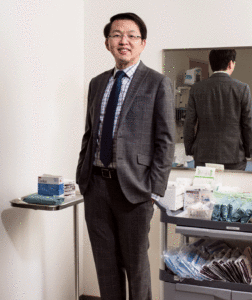Data is power – Dr. Winson Cheung, MD, researcher and oncologist, believes that big data can be used to gather health information more efficiently

Dr. Winson Cheung, Medical Oncologist and Provincial Director of Cancer Health Services Research. Photograph by Jared Sych.
Vast amounts of health information are collected across Alberta. This information, called ‘big data,’ is stored in massive databases and includes diverse, de-identified information about many people. A UCalgary team is using this big data to mimic clinical trials.
Randomized control trials (RCTs) are the gold standard to evaluate a new cancer drug or treatment. In RCTs, participants are randomly assigned to one therapy or another to compare effectiveness. While very valuable, RCTs can be expensive and last decades, and only represent less than 10 per cent of the population.
Dr. Winson Cheung, MD, a UCalgary researcher and oncologist, believes that big data can be used to gather health information more efficiently and on more patients than RCTs.
Using several Alberta administrative databases and the analytical expertise to interpret them, Cheung’s team hopes to provide real-world evidence to support better clinical decision-making. “The global pandemic over the past two years has taught us that data is power,” says Cheung. “Data and lessons learned from current patients can inform, model, and predict how we can improve the care of future patients.”
The new, world-class Calgary Cancer Centre will have hundreds of workspaces dedicated to data sciences. “Data scientists will be able to work side-by-side at the new cancer centre, making it easier to leverage and translate data to improve the lives of cancer patients and their families.”
At the new Calgary Cancer Centre, we’re bringing together researchers, medical teams, prevention experts, patients and families in ways never before possible.
Click here to learn about the five critical areas in which we aim to tackle cancer.
You can help clinicians and researchers like Amanda perform world-class cancer research by making a donation to the OWN.CANCER campaign today.
Click here to Donate.



